外研(新标准)版八下Module 1 Feelings and impressions知识点讲解课件(38张PPT)
文档属性
| 名称 | 外研(新标准)版八下Module 1 Feelings and impressions知识点讲解课件(38张PPT) | 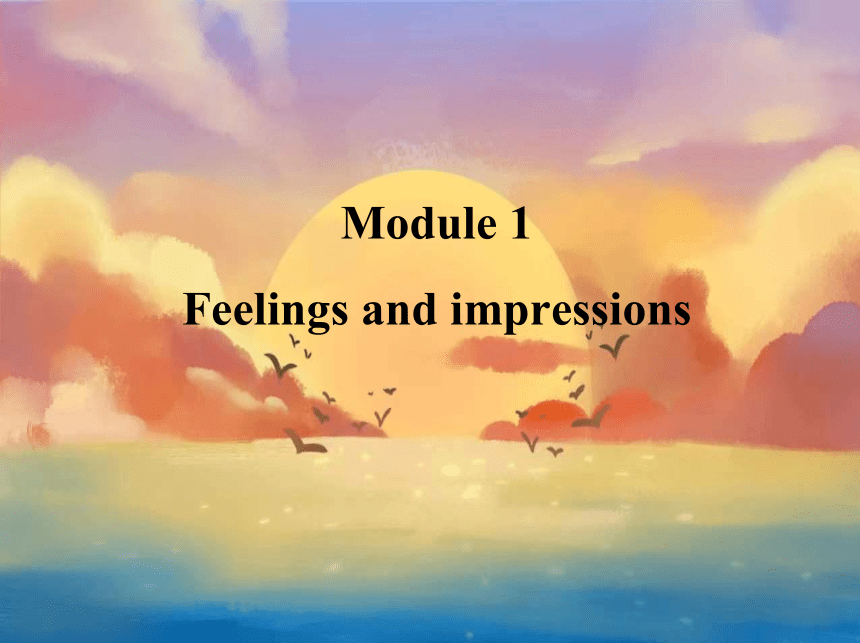 | |
| 格式 | pptx | ||
| 文件大小 | 305.3KB | ||
| 资源类型 | 教案 | ||
| 版本资源 | 外研版 | ||
| 科目 | 英语 | ||
| 更新时间 | 2022-04-11 23:00:55 | ||
图片预览

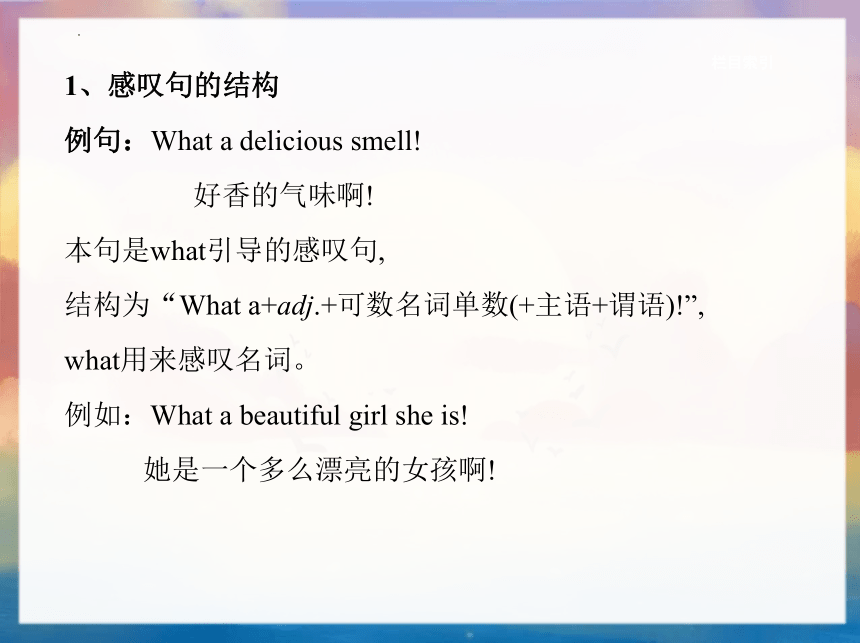
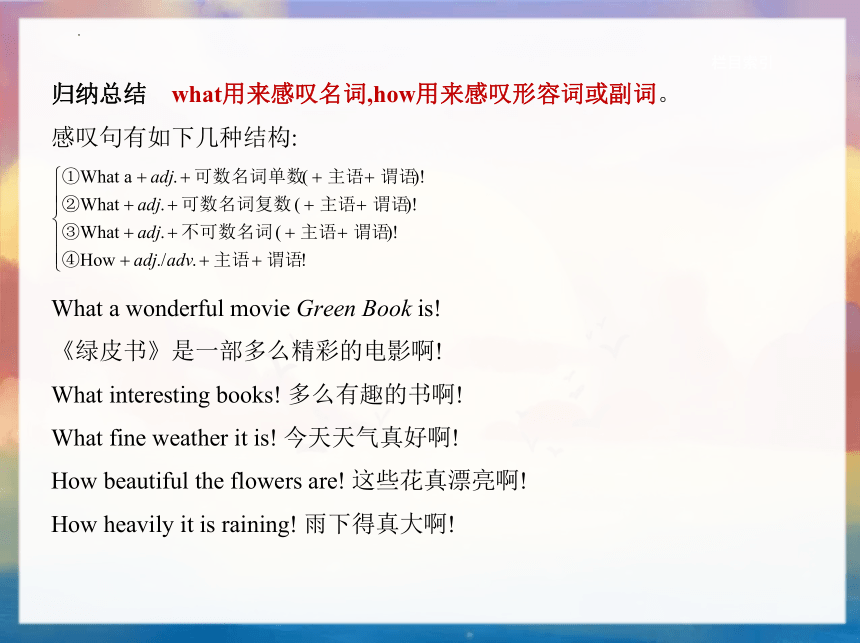
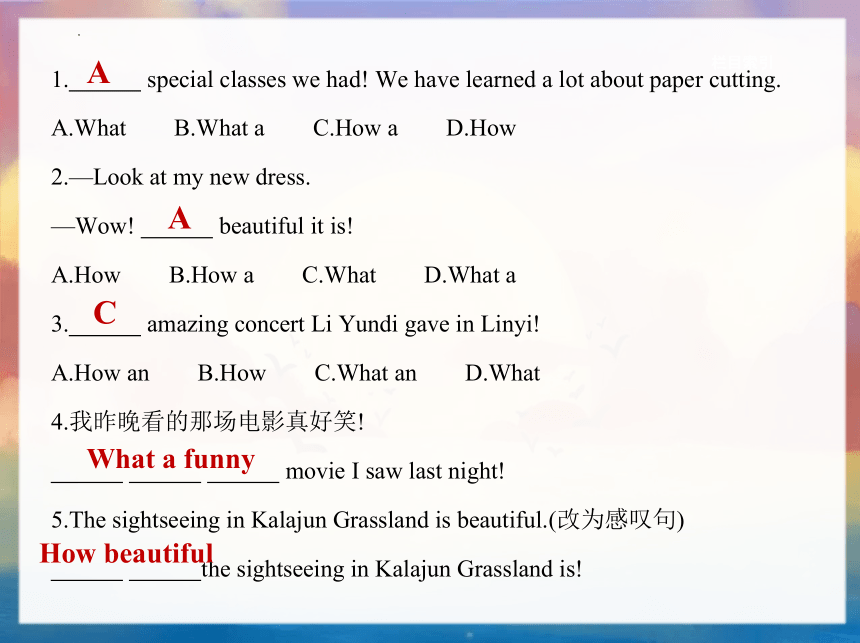
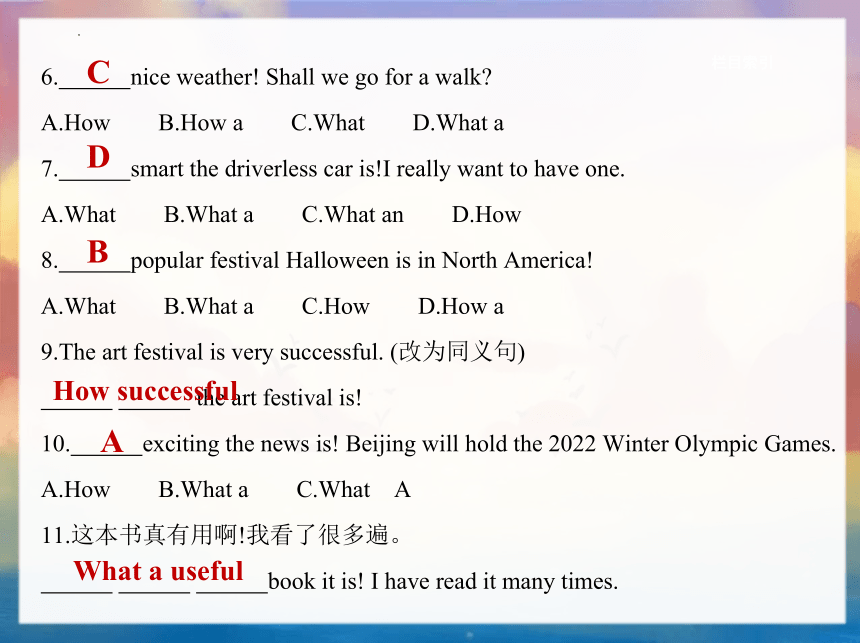
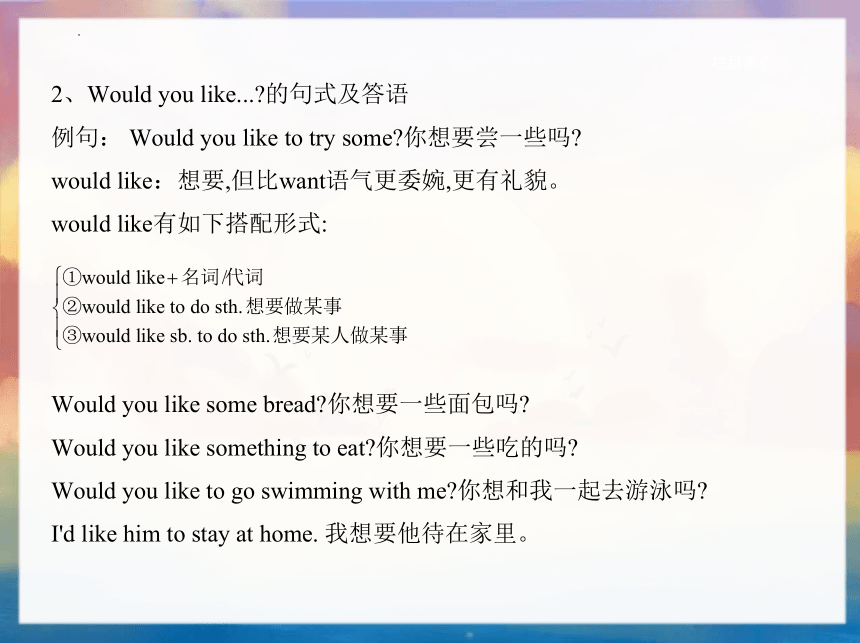
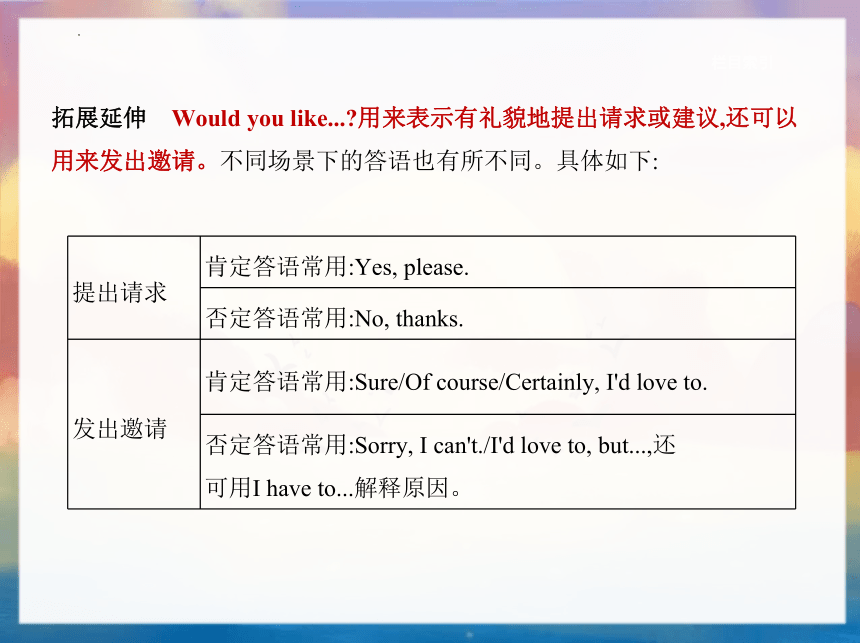
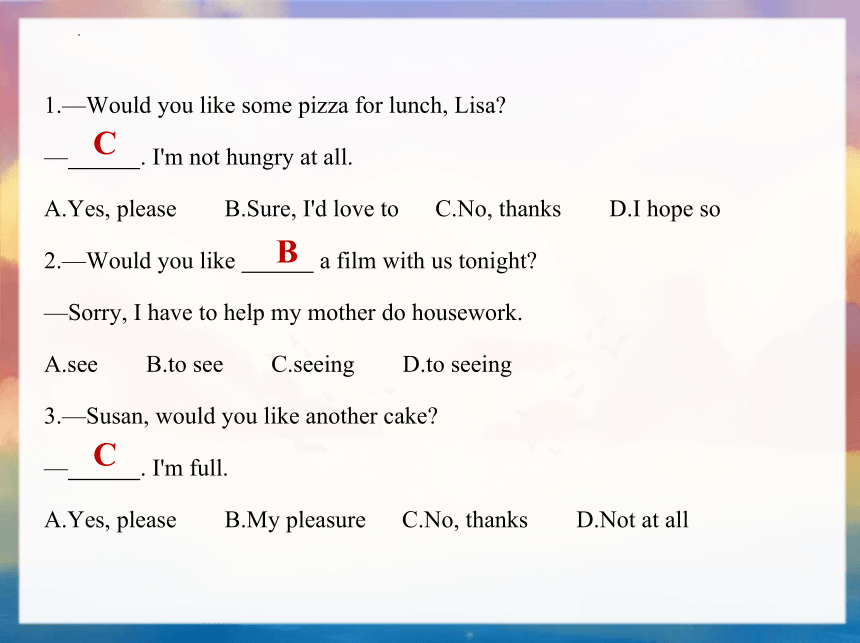
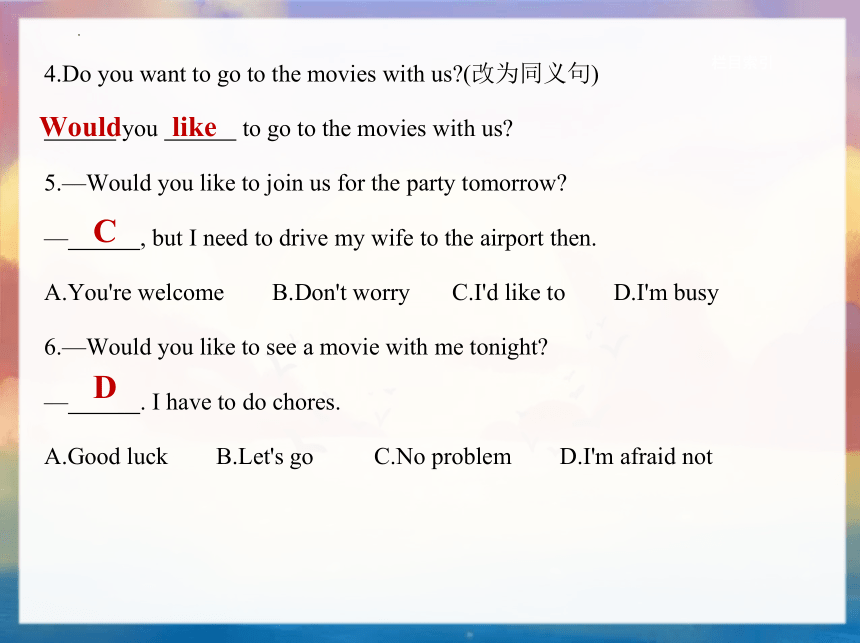
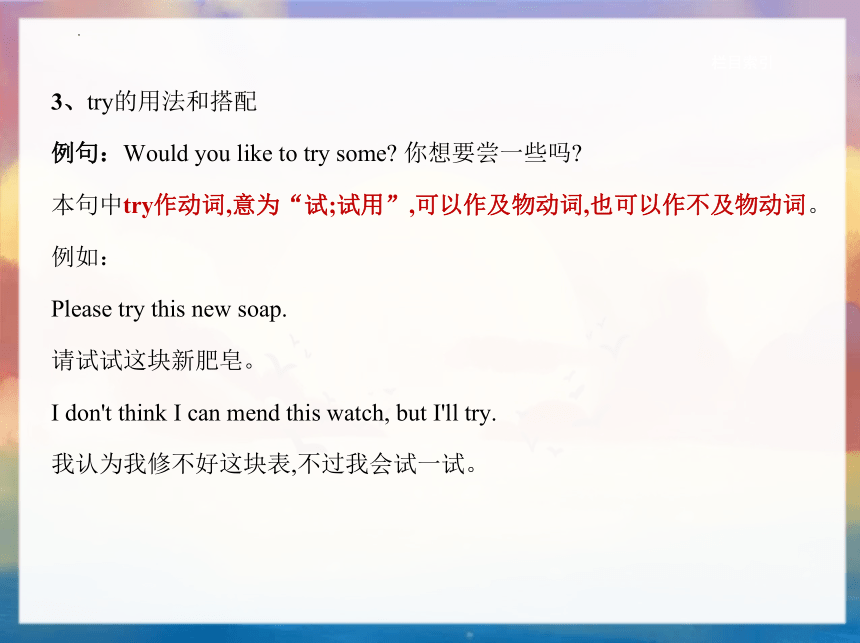
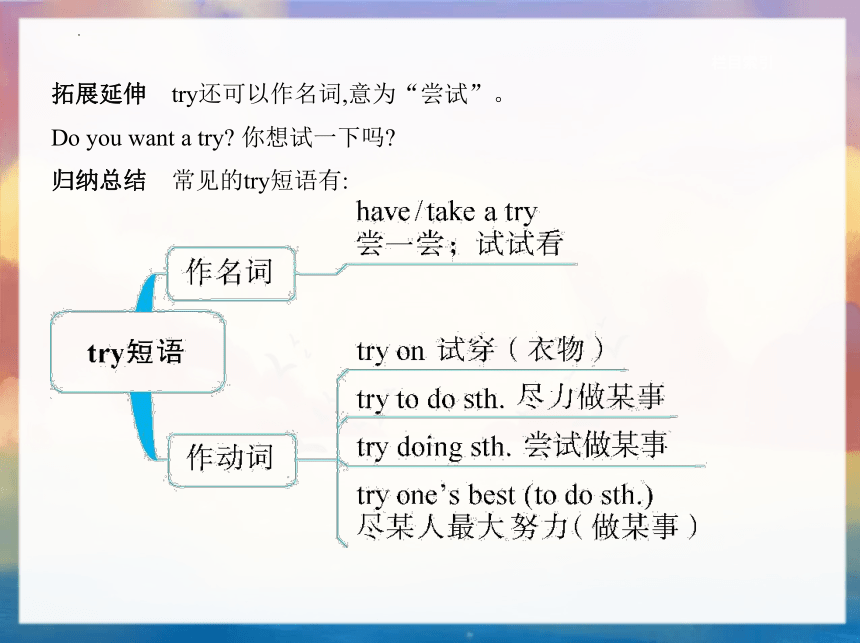
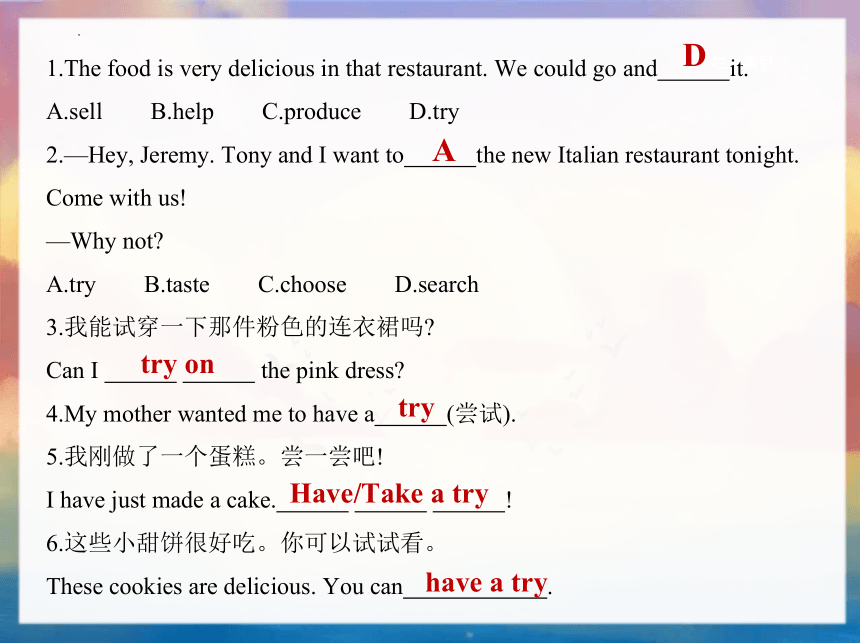
文档简介
(共38张PPT)
Module 1
Feelings and impressions
1、感叹句的结构
例句:What a delicious smell!
好香的气味啊!
本句是what引导的感叹句,
结构为“What a+adj.+可数名词单数(+主语+谓语)!”,
what用来感叹名词。
例如:What a beautiful girl she is!
她是一个多么漂亮的女孩啊!
归纳总结 what用来感叹名词,how用来感叹形容词或副词。
感叹句有如下几种结构:
What a wonderful movie Green Book is!
《绿皮书》是一部多么精彩的电影啊!
What interesting books! 多么有趣的书啊!
What fine weather it is! 今天天气真好啊!
How beautiful the flowers are! 这些花真漂亮啊!
How heavily it is raining! 雨下得真大啊!
1. special classes we had! We have learned a lot about paper cutting.
A.What B.What a C.How a D.How
2.—Look at my new dress.
—Wow! beautiful it is!
A.How B.How a C.What D.What a
3. amazing concert Li Yundi gave in Linyi!
A.How an B.How C.What an D.What
4.我昨晚看的那场电影真好笑!
movie I saw last night!
5.The sightseeing in Kalajun Grassland is beautiful.(改为感叹句)
the sightseeing in Kalajun Grassland is!
A
A
C
What a funny
How beautiful
6. nice weather! Shall we go for a walk
A.How B.How a C.What D.What a
7. smart the driverless car is!I really want to have one.
A.What B.What a C.What an D.How
8. popular festival Halloween is in North America!
A.What B.What a C.How D.How a
9.The art festival is very successful. (改为同义句)
the art festival is!
10. exciting the news is! Beijing will hold the 2022 Winter Olympic Games.
A.How B.What a C.What A
11.这本书真有用啊!我看了很多遍。
book it is! I have read it many times.
C
D
B
A
How successful
What a useful
2、Would you like... 的句式及答语
例句: Would you like to try some 你想要尝一些吗
would like:想要,但比want语气更委婉,更有礼貌。
would like有如下搭配形式:
Would you like some bread 你想要一些面包吗
Would you like something to eat 你想要一些吃的吗
Would you like to go swimming with me 你想和我一起去游泳吗
I'd like him to stay at home. 我想要他待在家里。
拓展延伸 Would you like... 用来表示有礼貌地提出请求或建议,还可以
用来发出邀请。不同场景下的答语也有所不同。具体如下:
提出请求 肯定答语常用:Yes, please.
否定答语常用:No, thanks.
发出邀请 肯定答语常用:Sure/Of course/Certainly, I'd love to.
否定答语常用:Sorry, I can't./I'd love to, but...,还
可用I have to...解释原因。
1.—Would you like some pizza for lunch, Lisa
— . I'm not hungry at all.
A.Yes, please B.Sure, I'd love to C.No, thanks D.I hope so
2.—Would you like a film with us tonight
—Sorry, I have to help my mother do housework.
A.see B.to see C.seeing D.to seeing
3.—Susan, would you like another cake
— . I'm full.
A.Yes, please B.My pleasure C.No, thanks D.Not at all
C
B
C
4.Do you want to go to the movies with us (改为同义句)
you to go to the movies with us
5.—Would you like to join us for the party tomorrow
— , but I need to drive my wife to the airport then.
A.You're welcome B.Don't worry C.I'd like to D.I'm busy
6.—Would you like to see a movie with me tonight
— . I have to do chores.
A.Good luck B.Let's go C.No problem D.I'm afraid not
C
D
Would like
3、try的用法和搭配
例句:Would you like to try some 你想要尝一些吗
本句中try作动词,意为“试;试用”,可以作及物动词,也可以作不及物动词。
例如:
Please try this new soap.
请试试这块新肥皂。
I don't think I can mend this watch, but I'll try.
我认为我修不好这块表,不过我会试一试。
拓展延伸 try还可以作名词,意为“尝试”。
Do you want a try 你想试一下吗
归纳总结 常见的try短语有:
1.The food is very delicious in that restaurant. We could go and it.
A.sell B.help C.produce D.try
2.—Hey, Jeremy. Tony and I want to the new Italian restaurant e with us!
—Why not
A.try B.taste C.choose D.search
3.我能试穿一下那件粉色的连衣裙吗
Can I the pink dress
4.My mother wanted me to have a (尝试).
5.我刚做了一个蛋糕。尝一尝吧!
I have just made a cake. !
6.这些小甜饼很好吃。你可以试试看。
These cookies are delicious. You can .
D
A
try on
try
Have/Take a try
have a try
4、it作形式主语时的句式
例句:It was great to hear from you, and I can't wait to meet you.
收到你的来信太好了,我都等不及要见你了。
本句是“It's+adj.+for sb.+to do sth.”的句式。
其中It是形式主语,真正的主语是其后的动词不定式。
例如:It's important for us to learn English well.
对我们来说学好英语是很重要的。
辨析 “It's+adj.+(for sb.+)to do sth.”和“It's+adj.+of sb.+to do sth.”
It's very hard for him to learn two languages.
对他来说学两门语言是很难的。
It's very nice of you to help me. 你来帮助我,真是太好了。
易错提醒 巧辨for 与of:用介词后面的代词或名词作主语,用介词前面的
形容词作表语,造个句子。如果道理上通顺则用of,不通顺则用for。
It's+adj.+for sb.+to do sth. 该句式常用于表示事物的特征、特点。
形容词常为表示客观形式的形容词,
如easy、hard、difficult、interesting、impossible等
It's+adj.+of sb.+to do sth. 该句式常用于表示人物的性格、品德。
形容词常为表示主观感情或态度的形容词,
如good、kind、nice、clever、foolish等
1.It is dangerous with a knife. It will cut your fingers.
A.play B.playing C.plays D.to play
2.—I often have hamburgers for lunch.
—You'd better not. It's bad for you too much junk food.
A.eat B.to eat C.eating D.ate
3.—Is it necessary us some photos before saving the old man
—Yes, it is. We can protect ourselves if we do so.
A.of;taking B.for;taking C.of;to take D.for;to take
4.I think it's impolite others waiting.
A.to keep B.keeping C.keep
5.It is wise Linda to make up her mind
to play an instrument.
A.for;learning B.for;to learn C.of;learning D.of;to learn
D
B
D
A
D
5、when 引导的时间状语从句
例句:I hope you will know me from my photo when I arrive at the airport.
我希望当我到达机场的时候,你能够根据我的照片认出我来。
本句结构较为复杂,首先,它含有宾语从句,主句是I hope,宾语从句是you
will know me from my photo when I arrive at the airport;该宾语从句中还含
有when引导的时间状语从句,when是连词,意为“当……的时候”。
例如:It was raining when we arrived there.
我们到达那里的时候,天正在下雨。
1.—What were you doing I knocked at the door
—I was sleeping.
A.unless B.once C.when D.if C
2.My grandparents wrote letters to keep in touch with
others they were young.
A.when B.since C.after D.before A
3.当我做错事的时候,你能帮我改正吗
4.A stupid man tells a woman to shut up,while a wise man tells her that her mouth is quite beautiful it is closed.
A.unless B.since C.when D.though C
C
A
C
Can you help me correct it when I do something wrong
6、proud的用法和搭配
例句:My brother is in the school tennis team—I'm very proud of him!
我哥哥是校网球队队员——我为他感到非常骄傲!
proud:到自豪的;感到骄傲的,短语:be proud of 为……感到骄傲
例如:They are very proud of their daughter.
他们为他们的女儿感到非常骄傲。
拓展延伸 be proud of=take pride in 都表示为……感到骄傲
pride为名词,自豪;骄傲,注意它们所搭配的介词不同。
We take pride in/are proud of our great motherland.
我们为我们伟大的祖国感到骄傲。
1.My parents are p of me because I saved a little boy.
2.We are very (自豪)that a student from our school has won the first prize.
3.Frank is an independent boy. His parents are proud him.
A.on B.to C.in D.of
4.Her son is making rapid progress, of which Mrs. Summers is very (pride).
5.Helping others makes us very .
A.lonely B.proud C.lazy D.harmful
6.我们为我们伟大的祖国而感到骄傲。
proud
proud
proud
We are proud of our great motherland.
D
B
7.—Dad, I was the first to reach the top of the hill.
—Good job, Mary. I'm of you.
A.afraid B.proud C.tired D.careful
8.我们为他感到自豪。
We are him.
9.Our country is becoming stronger and stronger and I'm (自豪的) of her.
10.My brother won the gold medal in the competition and I took pride in him.
=My brother won the gold medal in the competition and I was
him.
11.Luke's mother will be him if he wins the reading competition.
A.proud of B.tired of C.worried about D.strict with
B
A
proud
proud of
proud of
7、nervous 的用法
例句:I feel nervous when I speak Chinese...
我说中文时觉得紧张……
nervous 形容词,焦虑不安的;神经紧张的
例如:We feel nervous because of tomorrow's exam.
我们因为明天的考试而感到紧张。
1.Linda is shy. She always feels when she speaks in front of people.
A.relaxed B.nervous C.proper D.clear
2.—I do feel a little about making a speech.
—Take it easy. The more you prepare, the better you will feel.
A.upset B.disappointed C.nervous D.bored
3.—I always feel before giving a report in front of my classmates.
—I think you should do something fun to relax yourself and practice it more often.
A.lonely B.nervous C.excited D.tired
B
C
B
8、“特殊疑问词+动词不定式”的结构
例句: I'm always sorry when I don't know how to do things in the right way...
当我不知道怎样以正确的方式做事时,我总是很难过……
本句中的how to do things是“特殊疑问词+动词不定式”的结构,作know
的宾语。
例如:Can you tell me how to use the camera
你能告诉我怎样使用这个照相机吗
拓展延伸
We are talking about how to get there.
=We are talking about how we can get there.
我们正在讨论怎样到达那里。
1.I want to learn about how I can care for animals.
=I want to learn about how for animals.
2.—Could you please tell me how (get)to the nearest park
—Sure. Just go straight and turn left at the second corner.
3.Let's discuss when we shall go to the Sea World.
=Let's discuss go to the Sea World.
4.年轻人应该学习如何去照顾他人。
Young people should learn others.
to care
to get
when to
how to take care of
5.Would you show me an email, please First time for me.
A.how to make B.how to send
C.which to make D.when to send
6.当我到达机场的时候,我手里会拿着一面旗子。
I will hold a flag in my hand at the airport.
7.我们还没有决定什么时候探望爷爷奶奶。
We haven't decided our grandparents.
B
when I arrive
when to visit
9、表示感觉和知觉的系动词
感官动词 含义 对应的感觉器官
look 看起来 eye 眼睛
sound 听起来 ear 耳朵
smell 闻起来 nose 鼻子
taste 尝起来 mouth 嘴巴
feel 摸起来 hand 手
例如:
The old man sitting on the park bench looks familiar.
坐在公园长凳上的那个老人看上去很面熟。
The piece of music sounds very beautiful.
那首乐曲听起来很动听。
The chocolate cake smells sweet.
这块巧克力蛋糕闻起来很香。
The chicken soup tastes delicious.
鸡汤尝起来很美味。
The stone feels hard.
这块石头摸起来很硬。
1.Your cookies delicious. May I try some
A.smell B.sound C.taste D.see
2.—Have you tried the pizza
—Yes. It delicious.
A.looks B.tastes C.feels D.sounds
3.There are so many fish swimming in the pool. They very happy.
A.taste B.smell C.sound D.look
4.Look out! The food on the plate smells . You can't eat it.
A.badly B.bad C.good
5.The cheese cake so good that I can't wait to eat it.
A.tastes B.feels C.sounds D.smells
A
B
D
B
D
6.—Look, Linda. The flowers in our classroom came out in one night.
—I can't believe it. They are beautiful and colorful. They great.
A.sound B.smell C.taste
7.—Shrek is friendly but he ugly.
—I think so.
A.tastes B.smells C.sounds D.looks
8.It (闻起来)so strong that I don't like it at all.
9.That music (听起来) very beautiful. I like it a lot.
B
D
smells
sounds
10.The music (听起来)so beautiful that I am absorbed in it.
11.The air smells fresh.(改为否定句)
The air fresh.
12.—Mum, I'm hungry. Can I eat the food on the plate
—Sorry, you can't. It .
A.smells badly B.smells bad
C.smells good D.smells well
sounds
doesn't smell
B
13.—So, I'm happy to tell you we have a new plan for the weekend.
—That good! What is it
A.looks B.smells C.sounds D.feels
14.—The cheese doesn't good. Why don't we go to buy some fresh cheese
—Sounds great!
A.see B.find C.sound D.taste
C
D
10、spend、take、cost与pay
spend 可以表示“花时间”,也可以表示“花钱”,主语是人。
常见句型是“Sb. spend(s) some time/money on sth./doing sth.”
take 常用于表示“花时间”。
常见句型是“It takes sb. some time to do sth.”
cost 常用于表示“花钱”,主语多是事或物。
常见句型是“Sth. cost(s) sb. some money.”
pay 常用于表示“花钱”,主语是人,和介词for搭配。
常见句型是“Sb. pay(s) some money for sth.”
She spent two days (in) finishing making the model plane.
她花了两天时间做好了那架飞机模型。
She spent 100 yuan on a new dress.
她花100元买了一条新连衣裙。
It took me half an hour to clean the classroom.
我花了半个小时打扫教室。
The bike cost me 500 yuan.
那辆自行车花了我500元。
You need to pay 200 yuan for the books.
你需要为那些书支付200元。
1.Teenagers shouldn't too much money on expensive mobile phones.
A.spend B.pay C.take D.cost
2.Mike spent two days (finish)making the model plane.
3.Roy works in London. It him about half an hour
to get to work by bus every day.
A.costs B.spends C.takes
4.—Do you spend an hour volleyball every day
—Yes, I play it after school.
A.play B.playing C.plays D.to play
5.How long will it you to fly to Beijing from your hometown
A.spend B.take C.pay D.use
A
C
B
B
finishing
6.You'd better more time talking with your parents
so that they can understand you better.
A.spend B.take C.cost D.pay
7.—It takes me half an hour playing the piano. How about you
—I usually spend 20 minutes it.
A.practicing;on B.to practice;in
C.to practice;on
8.我每天花很多时间踢足球。
9.It about eight minutes for the light to travel from the sun to the earth.
A.pays B.costs C.spends D.takes
A
C
D
I spend much time playing football every day.
10.Now I spend time what I love to do.
A.to do B.doing C.do D.did
11.—Do you spend a lot of time the computer
—No, but I spend much time doing my homework.
A.on;in B.in;on C.on;on D.in;in
12.My brother spent three days making the model car.
my brother three days the model car.
13.Millie spends about two hours (finish) her homework every day.
B
A
It took to make
finishing
Module 1
Feelings and impressions
1、感叹句的结构
例句:What a delicious smell!
好香的气味啊!
本句是what引导的感叹句,
结构为“What a+adj.+可数名词单数(+主语+谓语)!”,
what用来感叹名词。
例如:What a beautiful girl she is!
她是一个多么漂亮的女孩啊!
归纳总结 what用来感叹名词,how用来感叹形容词或副词。
感叹句有如下几种结构:
What a wonderful movie Green Book is!
《绿皮书》是一部多么精彩的电影啊!
What interesting books! 多么有趣的书啊!
What fine weather it is! 今天天气真好啊!
How beautiful the flowers are! 这些花真漂亮啊!
How heavily it is raining! 雨下得真大啊!
1. special classes we had! We have learned a lot about paper cutting.
A.What B.What a C.How a D.How
2.—Look at my new dress.
—Wow! beautiful it is!
A.How B.How a C.What D.What a
3. amazing concert Li Yundi gave in Linyi!
A.How an B.How C.What an D.What
4.我昨晚看的那场电影真好笑!
movie I saw last night!
5.The sightseeing in Kalajun Grassland is beautiful.(改为感叹句)
the sightseeing in Kalajun Grassland is!
A
A
C
What a funny
How beautiful
6. nice weather! Shall we go for a walk
A.How B.How a C.What D.What a
7. smart the driverless car is!I really want to have one.
A.What B.What a C.What an D.How
8. popular festival Halloween is in North America!
A.What B.What a C.How D.How a
9.The art festival is very successful. (改为同义句)
the art festival is!
10. exciting the news is! Beijing will hold the 2022 Winter Olympic Games.
A.How B.What a C.What A
11.这本书真有用啊!我看了很多遍。
book it is! I have read it many times.
C
D
B
A
How successful
What a useful
2、Would you like... 的句式及答语
例句: Would you like to try some 你想要尝一些吗
would like:想要,但比want语气更委婉,更有礼貌。
would like有如下搭配形式:
Would you like some bread 你想要一些面包吗
Would you like something to eat 你想要一些吃的吗
Would you like to go swimming with me 你想和我一起去游泳吗
I'd like him to stay at home. 我想要他待在家里。
拓展延伸 Would you like... 用来表示有礼貌地提出请求或建议,还可以
用来发出邀请。不同场景下的答语也有所不同。具体如下:
提出请求 肯定答语常用:Yes, please.
否定答语常用:No, thanks.
发出邀请 肯定答语常用:Sure/Of course/Certainly, I'd love to.
否定答语常用:Sorry, I can't./I'd love to, but...,还
可用I have to...解释原因。
1.—Would you like some pizza for lunch, Lisa
— . I'm not hungry at all.
A.Yes, please B.Sure, I'd love to C.No, thanks D.I hope so
2.—Would you like a film with us tonight
—Sorry, I have to help my mother do housework.
A.see B.to see C.seeing D.to seeing
3.—Susan, would you like another cake
— . I'm full.
A.Yes, please B.My pleasure C.No, thanks D.Not at all
C
B
C
4.Do you want to go to the movies with us (改为同义句)
you to go to the movies with us
5.—Would you like to join us for the party tomorrow
— , but I need to drive my wife to the airport then.
A.You're welcome B.Don't worry C.I'd like to D.I'm busy
6.—Would you like to see a movie with me tonight
— . I have to do chores.
A.Good luck B.Let's go C.No problem D.I'm afraid not
C
D
Would like
3、try的用法和搭配
例句:Would you like to try some 你想要尝一些吗
本句中try作动词,意为“试;试用”,可以作及物动词,也可以作不及物动词。
例如:
Please try this new soap.
请试试这块新肥皂。
I don't think I can mend this watch, but I'll try.
我认为我修不好这块表,不过我会试一试。
拓展延伸 try还可以作名词,意为“尝试”。
Do you want a try 你想试一下吗
归纳总结 常见的try短语有:
1.The food is very delicious in that restaurant. We could go and it.
A.sell B.help C.produce D.try
2.—Hey, Jeremy. Tony and I want to the new Italian restaurant e with us!
—Why not
A.try B.taste C.choose D.search
3.我能试穿一下那件粉色的连衣裙吗
Can I the pink dress
4.My mother wanted me to have a (尝试).
5.我刚做了一个蛋糕。尝一尝吧!
I have just made a cake. !
6.这些小甜饼很好吃。你可以试试看。
These cookies are delicious. You can .
D
A
try on
try
Have/Take a try
have a try
4、it作形式主语时的句式
例句:It was great to hear from you, and I can't wait to meet you.
收到你的来信太好了,我都等不及要见你了。
本句是“It's+adj.+for sb.+to do sth.”的句式。
其中It是形式主语,真正的主语是其后的动词不定式。
例如:It's important for us to learn English well.
对我们来说学好英语是很重要的。
辨析 “It's+adj.+(for sb.+)to do sth.”和“It's+adj.+of sb.+to do sth.”
It's very hard for him to learn two languages.
对他来说学两门语言是很难的。
It's very nice of you to help me. 你来帮助我,真是太好了。
易错提醒 巧辨for 与of:用介词后面的代词或名词作主语,用介词前面的
形容词作表语,造个句子。如果道理上通顺则用of,不通顺则用for。
It's+adj.+for sb.+to do sth. 该句式常用于表示事物的特征、特点。
形容词常为表示客观形式的形容词,
如easy、hard、difficult、interesting、impossible等
It's+adj.+of sb.+to do sth. 该句式常用于表示人物的性格、品德。
形容词常为表示主观感情或态度的形容词,
如good、kind、nice、clever、foolish等
1.It is dangerous with a knife. It will cut your fingers.
A.play B.playing C.plays D.to play
2.—I often have hamburgers for lunch.
—You'd better not. It's bad for you too much junk food.
A.eat B.to eat C.eating D.ate
3.—Is it necessary us some photos before saving the old man
—Yes, it is. We can protect ourselves if we do so.
A.of;taking B.for;taking C.of;to take D.for;to take
4.I think it's impolite others waiting.
A.to keep B.keeping C.keep
5.It is wise Linda to make up her mind
to play an instrument.
A.for;learning B.for;to learn C.of;learning D.of;to learn
D
B
D
A
D
5、when 引导的时间状语从句
例句:I hope you will know me from my photo when I arrive at the airport.
我希望当我到达机场的时候,你能够根据我的照片认出我来。
本句结构较为复杂,首先,它含有宾语从句,主句是I hope,宾语从句是you
will know me from my photo when I arrive at the airport;该宾语从句中还含
有when引导的时间状语从句,when是连词,意为“当……的时候”。
例如:It was raining when we arrived there.
我们到达那里的时候,天正在下雨。
1.—What were you doing I knocked at the door
—I was sleeping.
A.unless B.once C.when D.if C
2.My grandparents wrote letters to keep in touch with
others they were young.
A.when B.since C.after D.before A
3.当我做错事的时候,你能帮我改正吗
4.A stupid man tells a woman to shut up,while a wise man tells her that her mouth is quite beautiful it is closed.
A.unless B.since C.when D.though C
C
A
C
Can you help me correct it when I do something wrong
6、proud的用法和搭配
例句:My brother is in the school tennis team—I'm very proud of him!
我哥哥是校网球队队员——我为他感到非常骄傲!
proud:到自豪的;感到骄傲的,短语:be proud of 为……感到骄傲
例如:They are very proud of their daughter.
他们为他们的女儿感到非常骄傲。
拓展延伸 be proud of=take pride in 都表示为……感到骄傲
pride为名词,自豪;骄傲,注意它们所搭配的介词不同。
We take pride in/are proud of our great motherland.
我们为我们伟大的祖国感到骄傲。
1.My parents are p of me because I saved a little boy.
2.We are very (自豪)that a student from our school has won the first prize.
3.Frank is an independent boy. His parents are proud him.
A.on B.to C.in D.of
4.Her son is making rapid progress, of which Mrs. Summers is very (pride).
5.Helping others makes us very .
A.lonely B.proud C.lazy D.harmful
6.我们为我们伟大的祖国而感到骄傲。
proud
proud
proud
We are proud of our great motherland.
D
B
7.—Dad, I was the first to reach the top of the hill.
—Good job, Mary. I'm of you.
A.afraid B.proud C.tired D.careful
8.我们为他感到自豪。
We are him.
9.Our country is becoming stronger and stronger and I'm (自豪的) of her.
10.My brother won the gold medal in the competition and I took pride in him.
=My brother won the gold medal in the competition and I was
him.
11.Luke's mother will be him if he wins the reading competition.
A.proud of B.tired of C.worried about D.strict with
B
A
proud
proud of
proud of
7、nervous 的用法
例句:I feel nervous when I speak Chinese...
我说中文时觉得紧张……
nervous 形容词,焦虑不安的;神经紧张的
例如:We feel nervous because of tomorrow's exam.
我们因为明天的考试而感到紧张。
1.Linda is shy. She always feels when she speaks in front of people.
A.relaxed B.nervous C.proper D.clear
2.—I do feel a little about making a speech.
—Take it easy. The more you prepare, the better you will feel.
A.upset B.disappointed C.nervous D.bored
3.—I always feel before giving a report in front of my classmates.
—I think you should do something fun to relax yourself and practice it more often.
A.lonely B.nervous C.excited D.tired
B
C
B
8、“特殊疑问词+动词不定式”的结构
例句: I'm always sorry when I don't know how to do things in the right way...
当我不知道怎样以正确的方式做事时,我总是很难过……
本句中的how to do things是“特殊疑问词+动词不定式”的结构,作know
的宾语。
例如:Can you tell me how to use the camera
你能告诉我怎样使用这个照相机吗
拓展延伸
We are talking about how to get there.
=We are talking about how we can get there.
我们正在讨论怎样到达那里。
1.I want to learn about how I can care for animals.
=I want to learn about how for animals.
2.—Could you please tell me how (get)to the nearest park
—Sure. Just go straight and turn left at the second corner.
3.Let's discuss when we shall go to the Sea World.
=Let's discuss go to the Sea World.
4.年轻人应该学习如何去照顾他人。
Young people should learn others.
to care
to get
when to
how to take care of
5.Would you show me an email, please First time for me.
A.how to make B.how to send
C.which to make D.when to send
6.当我到达机场的时候,我手里会拿着一面旗子。
I will hold a flag in my hand at the airport.
7.我们还没有决定什么时候探望爷爷奶奶。
We haven't decided our grandparents.
B
when I arrive
when to visit
9、表示感觉和知觉的系动词
感官动词 含义 对应的感觉器官
look 看起来 eye 眼睛
sound 听起来 ear 耳朵
smell 闻起来 nose 鼻子
taste 尝起来 mouth 嘴巴
feel 摸起来 hand 手
例如:
The old man sitting on the park bench looks familiar.
坐在公园长凳上的那个老人看上去很面熟。
The piece of music sounds very beautiful.
那首乐曲听起来很动听。
The chocolate cake smells sweet.
这块巧克力蛋糕闻起来很香。
The chicken soup tastes delicious.
鸡汤尝起来很美味。
The stone feels hard.
这块石头摸起来很硬。
1.Your cookies delicious. May I try some
A.smell B.sound C.taste D.see
2.—Have you tried the pizza
—Yes. It delicious.
A.looks B.tastes C.feels D.sounds
3.There are so many fish swimming in the pool. They very happy.
A.taste B.smell C.sound D.look
4.Look out! The food on the plate smells . You can't eat it.
A.badly B.bad C.good
5.The cheese cake so good that I can't wait to eat it.
A.tastes B.feels C.sounds D.smells
A
B
D
B
D
6.—Look, Linda. The flowers in our classroom came out in one night.
—I can't believe it. They are beautiful and colorful. They great.
A.sound B.smell C.taste
7.—Shrek is friendly but he ugly.
—I think so.
A.tastes B.smells C.sounds D.looks
8.It (闻起来)so strong that I don't like it at all.
9.That music (听起来) very beautiful. I like it a lot.
B
D
smells
sounds
10.The music (听起来)so beautiful that I am absorbed in it.
11.The air smells fresh.(改为否定句)
The air fresh.
12.—Mum, I'm hungry. Can I eat the food on the plate
—Sorry, you can't. It .
A.smells badly B.smells bad
C.smells good D.smells well
sounds
doesn't smell
B
13.—So, I'm happy to tell you we have a new plan for the weekend.
—That good! What is it
A.looks B.smells C.sounds D.feels
14.—The cheese doesn't good. Why don't we go to buy some fresh cheese
—Sounds great!
A.see B.find C.sound D.taste
C
D
10、spend、take、cost与pay
spend 可以表示“花时间”,也可以表示“花钱”,主语是人。
常见句型是“Sb. spend(s) some time/money on sth./doing sth.”
take 常用于表示“花时间”。
常见句型是“It takes sb. some time to do sth.”
cost 常用于表示“花钱”,主语多是事或物。
常见句型是“Sth. cost(s) sb. some money.”
pay 常用于表示“花钱”,主语是人,和介词for搭配。
常见句型是“Sb. pay(s) some money for sth.”
She spent two days (in) finishing making the model plane.
她花了两天时间做好了那架飞机模型。
She spent 100 yuan on a new dress.
她花100元买了一条新连衣裙。
It took me half an hour to clean the classroom.
我花了半个小时打扫教室。
The bike cost me 500 yuan.
那辆自行车花了我500元。
You need to pay 200 yuan for the books.
你需要为那些书支付200元。
1.Teenagers shouldn't too much money on expensive mobile phones.
A.spend B.pay C.take D.cost
2.Mike spent two days (finish)making the model plane.
3.Roy works in London. It him about half an hour
to get to work by bus every day.
A.costs B.spends C.takes
4.—Do you spend an hour volleyball every day
—Yes, I play it after school.
A.play B.playing C.plays D.to play
5.How long will it you to fly to Beijing from your hometown
A.spend B.take C.pay D.use
A
C
B
B
finishing
6.You'd better more time talking with your parents
so that they can understand you better.
A.spend B.take C.cost D.pay
7.—It takes me half an hour playing the piano. How about you
—I usually spend 20 minutes it.
A.practicing;on B.to practice;in
C.to practice;on
8.我每天花很多时间踢足球。
9.It about eight minutes for the light to travel from the sun to the earth.
A.pays B.costs C.spends D.takes
A
C
D
I spend much time playing football every day.
10.Now I spend time what I love to do.
A.to do B.doing C.do D.did
11.—Do you spend a lot of time the computer
—No, but I spend much time doing my homework.
A.on;in B.in;on C.on;on D.in;in
12.My brother spent three days making the model car.
my brother three days the model car.
13.Millie spends about two hours (finish) her homework every day.
B
A
It took to make
finishing
同课章节目录
- Module 1 Feelings and impressions
- Unit 1 It smells delicious.
- Unit 2 I feel nervous when I speak Chinese .
- Unit 3 Language in use
- Module 2 Experiences
- Unit 1 I've also entered lots of speaking competi
- Unit 2 They have seen the Pyramids.
- Unit 3 Language in use
- Module 3 Journey to space
- Unit 1 Has it arrived yet?
- Unit 2 We have not found life on any other planet
- Unit 3 Language in use
- Module 4 Seeing the docto
- Unit 1 I haven't done much exercise since I got m
- Unit 2 We have played football for a year now
- Unit 3 Language in use
- Module 5 Cartoons
- Unit 1 It's time to watch a cartoon.
- Unit 2 Tintin has been popular for over eighty yea
- Unit 3 Language in use
- Revision module A
- Module 6 Hobbies
- Unit 1 Do you collect anything ?
- Unit 2 Hobbies can make you grow as a person.
- Unit 3 Language in use
- Module 7 Summer in Los Angeles
- Unit 1 Please write to me and send me some photos
- Unit 2 Fill out a form and come to learn English
- Unit 3 Language in use
- Module 8 Time off
- Unit 1 I can hardly believe we are in the city ce
- Unit 2 We thought somebody was moving about
- Unit 3 Language in use
- Module 9 Friendship
- Unit 1 Could I ask if you've mentioned this to he
- Unit 2 I believe that the world is what you think
- Unit 3 Language in use
- Module 10 On the radio
- Unit 1 I hope that you can join us one day
- Unit 2 It seemed that they were speaking to me in
- Unit 3 Language in use
- Revision module B
